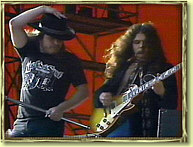 "Pick It Gary" |
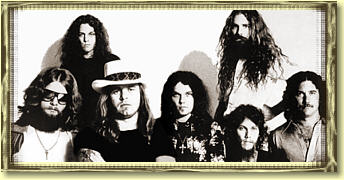 Leonard Skinner fan club. |
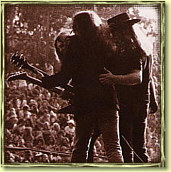 "Give it to e´m !" |
| Lynyrd Skynyrd History 2 |
 "Pick It Gary" |
 Leonard Skinner fan club. |
 "Give it to e´m !" |
| For
Skynyrd's fourth album, Rudge arranged for Tom Dowd (producer
of Aretha Franklin, Cream, and the Allman Brothers, among
many others) to take over the controls. Dowd's approach
involved rehearsing and recording each song with the band
as a unit, in contrast to Kooper's penchant for
overdubbing. They learned things from him about
arrangements and chord patterns, but the resulting album,
"Gimme Back My Bullets", lacked energy. It was,
in fact, a low point in the band's career, the worst-selling
album they ever put out. Part of the problem was lack of
time; they had had years to prepare the material that
went into the first two albums, and the third and fourth
were virtually written in the studio. There were problems
with the title track as well. Van Zant said,"We had to quit doin' that song, because almost every audience would throw a handful of bullets, you know, like .38 slugs. We wrote it about the bullets in the music industry trade magazines, but I'd say "Gimme back my bullets", and they'd let me have it." After the "Bullets" album, Skynyrd added a trio of female gospel-type singers to their act; Jo Billingsley, Leslie Hawkins, and Cassie Gaines. With the next recording session set for July of 1976, the band set about finding a third guitarist before then. They had auditioned players like Leslie West and Wayne Perkins when Cassie Gaines mentioned that her younger brother Steve was a guitarist. They agreed to audition him more as a favor to Cassie than anything else, but once he started jamming with them it was clear that a match had been made. |
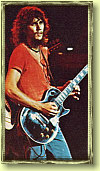 Steve Gaines |
Van Zant said of him,"This kid is a
writing and playing fool. He's already scared everybody
in the band into playing their best in years". Gary
Rossington said,"He was a freak of nature, he was so
good. He inspired us tremendously. He was a great singer,
too, and it sort of kicked Ronnie in the ass a little bit.
He had to try harder because Steve was there." Gaines was familiar enough with Skynyrd's work that his band, Crawdaddy, played "Saturday Night Special" as part of their regular set, but there was only a month before recording was to start. He spent the month of June in marathon "cramming and jamming" sessions. The album was recorded live in the Fox Theatre in Atlanta, a small venue chosen specifically for its acoustics. With the addition of Steve Gaines, and the direction of Tom Dowd, the band turned in a classic performance. Dowd described the working arrangements that resulted in "One More for the Road": "Each night after the show I'd make them listen to the whole thing. I'd say,"We have to do this song again. This one over here, we have to change this way", and so on. We changed two or three songs a day, so that no two shows were the same, and in the end we had more than ten or twelve songs to pick from." |
| Although the live album was good, it could
not convey the excitement of an actual gig. Skynyrd was
by now one of the premier performance bands in the world.
At the Gator Bowl benefit for President Jimmy Carter in
July of 1976, Skynyrd was the main attraction; in August they performed at Britain's Knebworth Festival, earning rave reviews at the expense of the headlining Rolling Stones. Still, "One More for the Road" quickly entered the Top Ten, earning gold and then platinum status. In part to celebrate this success, the band traded their touring bus for a private plane. Skynyrd and Tom Dowd went into Miami's Criteria Studios in April of 1977 with enough material to complete an album. Once the recording was done, however, disagreements broke out over the post-production values, and the band went on tour none too satisfied with the results of the sessions. In spite of those problems, the band's summer tour in 1977 was their most impressive ever. The San Francisco Examiner said that they "overpowered most of the other acts" and that "a tidy mixture of country standards, hard-rocking originals, and unconcerned euphoria gained for Skynyrd what none of the other bands were able to match: a straight-forward triumph." At the end of the tour, the band booked themselves into Doraville's Studio One to finish the album begun at Criteria. Tom Dowd was committed to a project in Toronto, and sent engineer Barry Rudolph to Georgia as his surrogate. Rudolph had engineered Waylon Jennings' classic "Are You Ready for the Country?"album, and those credentials made him welcome in the Skynyrd studio. |
| Van Zant had often said that Lynyrd
Skynyrd were just "street people". From this,
and from their reputation for brawling, came the title of
this next album, "Street Survivors". It contained some of the most concise writing Van Zant had ever done, in part because MCA had decreed that this album was to produce at least three hit singles - that is, songs no more than three minutes long. At the time, that was as long as a song could be and still expect popular airplay. Tom Dowd remembered how difficult this was for Van Zant; "He'd come to me with a song, and say,"How long is that?", and I'd say," About 3:45", or whatever. Ronnie would say,"I can't cut no more out of that", and I'd say,"We'll speed it up and shorten the intro." When the whole thing was over, Ronnie said to me,"That's the last time I ever write a three-minute song, as long as I fuckin' live. If I want to write a book, I'm going to write a book and not a piece of toilet paper." No matter how Van Zant felt about it, "Street Survivors" was a fantastic success. It was the first Skynyrd album to be certified gold upon release, and all indications were that it would become the most popular in their twelve year career. The album cover, showing the band standing tall while surrounded by flames, seemed likely to become an American icon. |
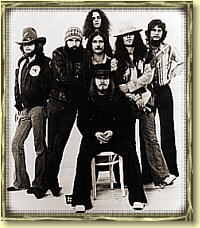 Say CHEEESE ! |
"Street Survivors" was released on October 17, 1977. On October 20, Lynyrd Skynyrd's private 1947 Convair 240 plane ran out of gas due to "an engine malfunction of undetermined nature", and crashed in a forest near McComb, Mississippi. Steve Gaines, Cassie Gaines, and Ronnie Van Zant were killed upon impact. The rest of the band suffered serious injuries that, in some cases, caused permanent physical damage. The final irony was that this had been billed, after the album, as the "Tour of the Survivors". |
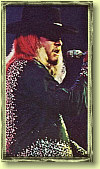 "Swamp Swamp Music,,," |
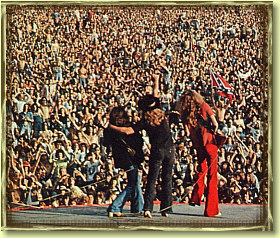 Fly On Freebird ! |
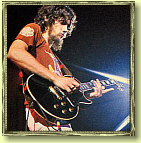 "Gimme a T For Texas,,," |
| Janssonsfrestelse.com | Boogie, Blues, Southern Rock |
Charlies Sajberhem |
| Knep och Knåpyrajt: Sir Charles Production.Inc |
Kontakta Webmaster |
Skriv ett par rader i Gästboken |
Du
är besökare nr: sedan starten 2001 |